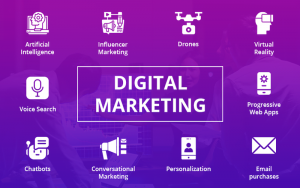Unlock the Power of Organic Traffic: Ultimate Growth Tools for Your Website

Digital Marketing begins with attracting individuals. If you cannot attract the appropriate audience to your digital channels, you will not see any results.
Also Read:- SEO Unveiled: Techniques to Drive Organic Traffic in 2024
Long ago, the primary methods for attracting the attention of prospective customers were paid. Nonetheless, this situation has unquestionably improved due to the Internet’s ongoing development.
Today, it is possible to attract visitors to a website without paying for advertising or email lists; this is known as organic traffic.
With good reason, organic traffic is the primary objective of many businesses employing digital strategies to acquire customers.
Want to know why so many people care about organic traffic and how your business can benefit from it? Continue to read.
What is Organic Traffic?
Organic traffic is the traffic you get from people who found your site through a search engine like Google or Bing. It helps increase sales, return on investment, and consumer count. It’s also known as Website traffic
You cannot say without a doubt that organic traffic is free, because strategies to attract visitors cost money and take effort.
However, the main difference between organic traffic and paid traffic is that, in the first case, you spend money once to reap long-term benefits.
For example; Producing a blog post takes time and costs money, but it can generate continuous results. In contrast, an advertisement only lasts as long as you pay for it.
What is the importance of organic traffic?
There are a variety of methods in which visitors can access your site. Both organic and paid traffic contribute to the overall number. Organic traffic is free, relevant, and brings in potential buyers. Users enter keywords into a search engine’s query bar with a clear goal in mind. They look for reliable resources that might help them with their issues. All of the listed search engines return relevant results based on user queries. Your business and product can be a long-awaited answer. If you understand their requirements, you can convert users into customers.
Teams develop and bring about numerous search engine optimization tactics to increase website visitors and organic traffic. Organic traffic is free and generates fresh leads, unlike paid advertising. The more people who visit your site, the more chances you have of attracting new clients. Therefore, your income increases. In addition, people tend to seek out high-quality information on websites that receive substantial organic traffic. As a result, you can enhance your company’s reputation.
Now that you recognize its significance, let’s discuss investing in organic traffic.
What are the benefits of organic traffic investment?
As was discussed before in the article, many companies now prioritise organic traffic when planning their Digital Marketing strategy.
The time has come to learn why this is the case. Analyse the positive effects this strategy could have on your company.
Cost-benefit analysis
First, if you’re trying to cut down on marketing costs, organic traffic is the way to go.
The result is an increase in the profit margin on sales. Therefore, organic traffic has the best cost-to-benefit ratio.
Relevance
Google indicates to the user when a search result is advertising. Therefore, users are already aware that the page in question is attempting to sell them something, which diminishes their trust.
The organic result, on the other hand, is regarded as genuine and acquires instant credibility.
Scalability
Advertisements are not scalable. Your traffic will start going down the minute you cease paying for them.
Moreover, it may be prohibitively expensive to attract a large number of qualified visitors. The converse is true for organic traffic: the more visits you receive, the lower your cost per visit.
Time frame
An organic strategy has no expiration date.
A single blog post can generate millions of dollars in sales over time, which is nearly impossible when compared to the cost of maintaining a continuous paid traffic campaign.
Six Ways to Increase Organic Website Traffic
There are numerous methods for increasing organic traffic. We have compiled a list of suggestions for increasing your website’s traffic.
Create captivating headlines. The headline is the first thing that users notice when searching for relevant content. Therefore, you must choose the headline with care. It should be concise, captivating, pleasant, and clear.
Fix the stuff that isn’t working. You cannot always produce articles with exceptional performance. Some fail to generate the required number of conversions, organic traffic, referrals, etc. To avoid a negative impact on your website’s reputation, you must identify and enhance these articles. Conduct an analysis to determine the content with the highest and lowest performance. Then, compare these resources and revise or rewrite those that perform poorly.
Use long-term keywords. If you want to learn how to get people to visit your website, writing informative content is only half of the battle. When you do keyword research, focusing on long-tail terms can help you get a lot more organic traffic.
Long-tail keywords are a collection of three or four words, like “best WordPress security plugins” or “restaurants in Lagos, Nigeria.” Use long-tail keywords in the titles of your blog posts to make them more engaging. When you’re looking for keyword ideas, you might want to use tools like Ahrefs’s free keyword creator.
Pay attention to featured snippets. Google displays paragraphs, definitions, and lists from web pages. Features boost organic traffic by displaying small samples from your articles. Add headers, offer “how-tos” in your articles, use analytics tools to reveal how competitors can appear in snippets, and do keyword research to appear in search engine featured snippets. Additionally, give users concise, truthful replies.
Review the SEO strategy. Optimise your website’s text and images for search engines. Utilise internal links to direct users to your new content. Meta descriptions are crucial for attracting new visitors to your website.
Introducing guest blogging. Guest blogging is an ideal approach for attracting new readers and, ultimately, consumers to your website. Create articles for publication on credible and relevant websites that relate to your industry. People who find your content valuable will visit your website and read additional articles. If they view your product or service as the best option, they may become your customers.
5 Strategic Tools for Increasing Organic Traffic to Your Website Using SEO
Today is kind of a golden age for digital marketing tools and platforms, which means that there are a lot of great choices for almost any task.
However, this abundance can pose a problem for retailers, who must wade through a sea of SaaS solutions to discover the top-tier contenders.
Consequently, the following are some of the best tools for sellers to utilise:
SEMrush
SEMrush is one of the market’s foremost SEO platforms. This all-inclusive auditing tool facilitates sellers to audit their SEO opportunities and gather valuable insights from competing websites, thereby enabling a site to increase its organic traffic levels.
Using SEMrush, businesses can identify vital organic keywords that their site can rank for, identify powerful SEO backlink opportunities, capture brand mentions for advertising opportunities or brand sentiment analysis, and perform a multitude of other crucial search engine optimization duties.
Among the most notable characteristics of SEMrush’s platform are:
- Backlink audit tools
- PPC keyword tools
- On-page SEO analysis
- Content evaluator
- Organic traffic statistics
Ahrefs
Ahrefs is an additional premier SEO tool for online retailers.
Comparable to SEMrush, Ahrefs is an SEO suite that includes a variety of SEO analysis and enhancement tools for boosting visibility and organic traffic.
Using Ahrefs, businesses can acquire a comprehensive organic search report that provides an in-depth review of the exact keywords for which competing websites rank in the SERPs. In addition, Ahrefs provides vendors with keyword suggestions for increasing SERP exposure and clicks.
In addition to these features, Ahrefs includes the following:
- Tools for keyword investigation
- Rank trackers
- Site structure statistics
- Backlink tester
- Content gap tools
Moz Pro
Moz Pro is one of the most prominent online SEO software packages. Moz is the market support in its category because it is equipped with a variety of SEO auditing components that enable sellers to optimise their websites and achieve higher rankings in the SERPs.
Moz is a full-service platform that experts all over the world rely on for their optimization efforts, regardless of whether vendors are looking for keyword suggestions, want to crawl their website, or simply uncover backlink opportunities.
In addition, Moz offers retailers the free MozBar toolbar, which enables them to view their website’s metrics while browsing any page, thereby providing a wealth of valuable insights.
- Google Analytics
Google Analytics is virtually essential when discussing tools for increasing organic traffic.
While Google Analytics serves predominantly as an SEO monitoring tool, integrating it into the company’s technology stack is essential for optimising organic traffic.
Google Analytics provides sellers with insightful data concerning organic traffic, traffic sources, time spent on site, page performance, bounce rates, and other crucial metrics.
Google Analytics is naturally free to use and straightforward to integrate with ecommerce websites. In addition, when sellers integrate Google Analytics with Google Search Console, they will be able to obtain even more valuable reporting data, such as the keywords searchers use to locate a store, the site’s SERP presence, and more.
- Google Search Console
While we are discussing Google tools, it seems appropriate to discuss Google Search Console.
Google Search Console, another of Google’s free offerings, permits retailers to monitor and report on their site’s performance in Google’s search engine results pages. The only thing merchants must do to verify their website is to incorporate a piece of code. Alternately, sellers can submit their sitemap for indexing to Google Analytics.
While a Search Console account is not required for retailers to appear in the SERPs, it is advantageous as it gives merchants greater control over which pages are indexed and how their website is represented.
As an SEO auditing tool, Google Search Console can help retailers understand how Google and its users perceive their store, allowing them to optimise their site for improved SERP performance.
Final Reflections
In reality, selecting ecommerce tools for organic traffic growth need not be a daunting endeavour. There are numerous available tools, but those on this list are all solid options.
Regardless of the quality of one’s toolkit, it is essential to consider that SEO requires time to produce results. Therefore, it is essential to understand that sales SEO tools serve as a means to an end and not an objective in themselves.
Rather, what matters most is that retailers establish a comprehensive, robust SEO strategy that caters to on-site, off-site, and technical factors while also incorporating tangential factors, such as social signals and the like.
Building a successful SEO strategy and selecting the appropriate tools can be a challenging task.








